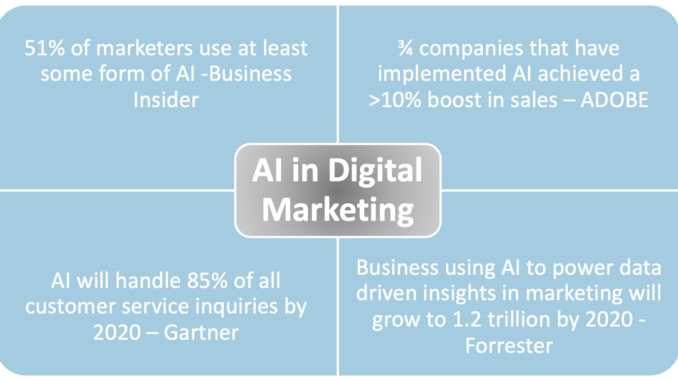
AI is now more accessible than ever with it’s potential to change business forever. With its positive impact, and being a lot more affordable than before, both big and small companies are able to benefit from the insights and automation options it provides. With the integration of AI brands can not only leverage customer’s data but also anticipate their customer’s next move, understand sales cycles better, correlate their strategies for converting prospects into paying customers and improve the overall customer’s journey with machine learning efforts.
As a subset of AI, machine learning involves the analysis of historical data from various business interactions with customers / prospects (for example: when and what was the last time the customer ordered?). As ML has the ability to analyse extremely large sets of data, its being used in the digital marketing departments around the globe to identify sales patterns and increase success factors. Algorithms for ML generate insights via predictive analytics, based on these insights, marketers can either take actions individually or automate AI to do the job. For example, they can automate emails that are aimed at re-targeting your audience, giving you a better chance of a higher ROI.
ML is also playing a major role in SEO. Even tough SEO algorithms change across major search platforms, with AL and ML tools, the insights from searchable content may become more relevant than specific keywords in the search process. In order to maintain a high-ranking place on search engine result pages, consider the quality of your content rather than simply the keywords included. By doing so, you’ll be ahead of the game when it comes to future-forward content creation and SEO.
Marketers can also benefit from ML tools to analyse what type of content, keywords, and phrases are most relevant to your desired audience. Once they have the key insight, they can optimize their dialogue and develop engagement across multiple online platforms, to drive brand awareness and create meaningful relationships with leads, prospects, and customers alike
The key difference between modern AI-based and traditional outbound marketing strategies is the integration of contextual data, i.e. information that results from the interaction with the customer is not stored in labour-intensive and time-consuming data warehouses but is available in real time and can be used for decision-making. With these customer profiles and interests recorded in parallel to the interaction, the previously defined decision strategies are fed in order to achieve high planning security for high, profitable conversion rates.
Artificial intelligence opens up possibilities in marketing domain far beyond currently available functions. PwC estimates that business could save $2 trillion globally by applying intelligent automation to many activities that were previously processed by humans and making employees more productive. In addition to that, AI, robotics and other forms of smart automation will bring great economic benefits and contribute up to $15 trillion to global GDP by 2030.
With AI integrated marketing, business can forecast customer behaviour and run data-based campaigns to have remarkable results. It helps them to save a lot of money on marketing and sales efforts by bringing them valuable leads. Not only business can achieve valuable leads and turn them into customers but they can also maintain a good relation and provide a better service to these customers by introducing a 24/7 customer service with the help of AI equipped chatbots. These chatbots are able to handle customer enquiries and provide customer support on time and appropriately, based on the needs of customers. Business are creating value through transforming customer journeys by providing immediate response to consumer’s queries or issues. According to McKinney’s study, 75% of customer demand NOW service within 5 minutes of online contact. If business can beat this time, they can convert a ‘visitor’ into a ‘paying’ customer.
Here below are some interesting statistics of AI in marketing:
The ways that ML is being used in digital marketing practices helps organizations to expand their understanding of their target consumers and how they can optimize their interactions with them. So, when developing appropriate AI applications for marketing purpose, the collaboration between software developers and domain expert’s must not be neglected. The ultimate decision-making competence when it comes to the all-important question of which next best actions are to be implemented in order to achieve the greatest possible marketing success usually belongs to the domain experts. You should have the experience and expertise to incorporate the right NBAs into the self-learning models for decision-making strategies.
Source:

Leave a Reply